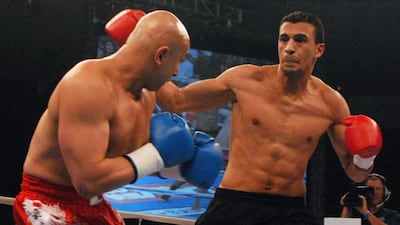Badr Hari is not someone you want to upset.
In June 2005, the Dutch-Moroccan kick-boxer was knocked out by a trademark spinning back kick from Croatian-German Stefan Leko.
After getting severe criticism from the Dutch public for his loss, the heavyweight fighter decided he would no longer represent the Dutch flag, but that of Morocco. Revenge would follow.
Hari, who now holds dual nationalities, is in Dubai for Thursday night’s Global Fighting Championship, a kick boxing tournament with prize money of Dh1 million up for grabs.
His opponent? The 39-year-old Leko.
Hari, 29, is 193 centimetres tall and looks pretty cool. He’s also charming.
“It’s the first time for me fighting as a Muslim, in a Muslim country,” he said at yesterday’s news conference.
It is the latest milestone in Hari’s career.
In 2007 in Hawaii, Hari defeated Yusuke Fujimoto in 56 seconds to become the first K-1 Heavyweight Champion. Two years later, he clinched the It’s Showtime Heavyweight Championship (+95kg) by beating Semmy Schilt, making him the only fighter to have won the competition three times in a row.
He has earned several nicknames: “The Golden Boy”, “Devil Prince of Morocco” and “The Cobra”.
Also, “The Bad Boy”, for his short temper and several incidents outside the ring.
In Dubai yesterday he looked relaxed and very much at home.
“It’s not the first time I’ve been in Dubai, I’ve been here many times, but it’s been on holiday,” Hari said. “But, like I said, this is first time for me fighting in an Islamic country and it was always a big thing for me to achieve that, to make that come true.”
Hari has been in Dubai for the past 19 days, getting himself into shape for his fight. If he wins he will meet the winner of the fight between Peter Graham and Arnold Oborotov for the big prize.
“The preparation is very good, the first four or five days it was tough to get used to the heat,” said Hari, who weighs 109 kilograms. “It’s very warm and humid, and I was getting tired every time I trained. But for the last week it’s been very good, I’m getting used to it and getting in shape.”
Not that his training has been done outdoors. With temperatures hitting 40°C during the day, sessions are strictly indoor affairs.
“Listen, even walking outside is already heavy here,” Hari said, laughing. “It’s just getting used to the weather, it was very hard but I think I did very well.”
For Hari, the mental conditioning is as vital as the physical one.
“It’s always better to come somewhere earlier to get used to the place, where to eat, where to stay, it is all very important,” he said. “I do this most of the time, whenever I go to a country I stay two or three weeks, to get the feel of the place and the people.”
Hari began kick-boxing at the age of seven with former world champion Mousid Akamrane in Amsterdam and knew from a young age what destiny he had. “I was too young to know for sure that I will be [a champion], but it was at the age of 12 or 13 that I was already focused on getting to where I am now,” Hari said.
It was by no means an easy route to success. Conservative Arab families put heavy emphasis on education and are often reluctant to let their children deviate from an academic path. Hari’s were no different.
“For me it was the same, school is very important,” he said. “It’s the basis of our lives, to gain knowledge, but what I say to people is chase your dreams, because that’s also very important.”
As martial arts continue to grow in the Middle East, Hari has a message for both youngsters and parents.
“My parents didn’t support me the first couple of years, because often I wouldn’t go to school but to the gym. They were very hard on me,” he said. “The only thing I can say is trying to find the balance of supporting them in school and in sport. Try to find a way in the middle.”
It worked for Hari and on Thursday night he is keen to show his fans how far he has come.
Revenge for that early loss to Leko had been swift. In November 2005, Hari knocked out his rival at the K-1 Grand Prix.
He is confident of adding another victory to his record of 102 wins (88 knockouts) and 12 Losses.
“I think I will knock him out very quickly, the last time I met him I was just a kid weighing 85 kilos and I was 10 years younger, 19 or 20,” Hari said. “I’m much more experienced, much stronger and he’s become older, he’s almost 40 now. When you get to this level of sports, whether it’s Formula 1 or tennis, a 40-year-old guy cannot win against a 30-year-old guy.”
akhaled@thenational.ae
Follow our sports coverage on Twitter @SprtNationalUAE

